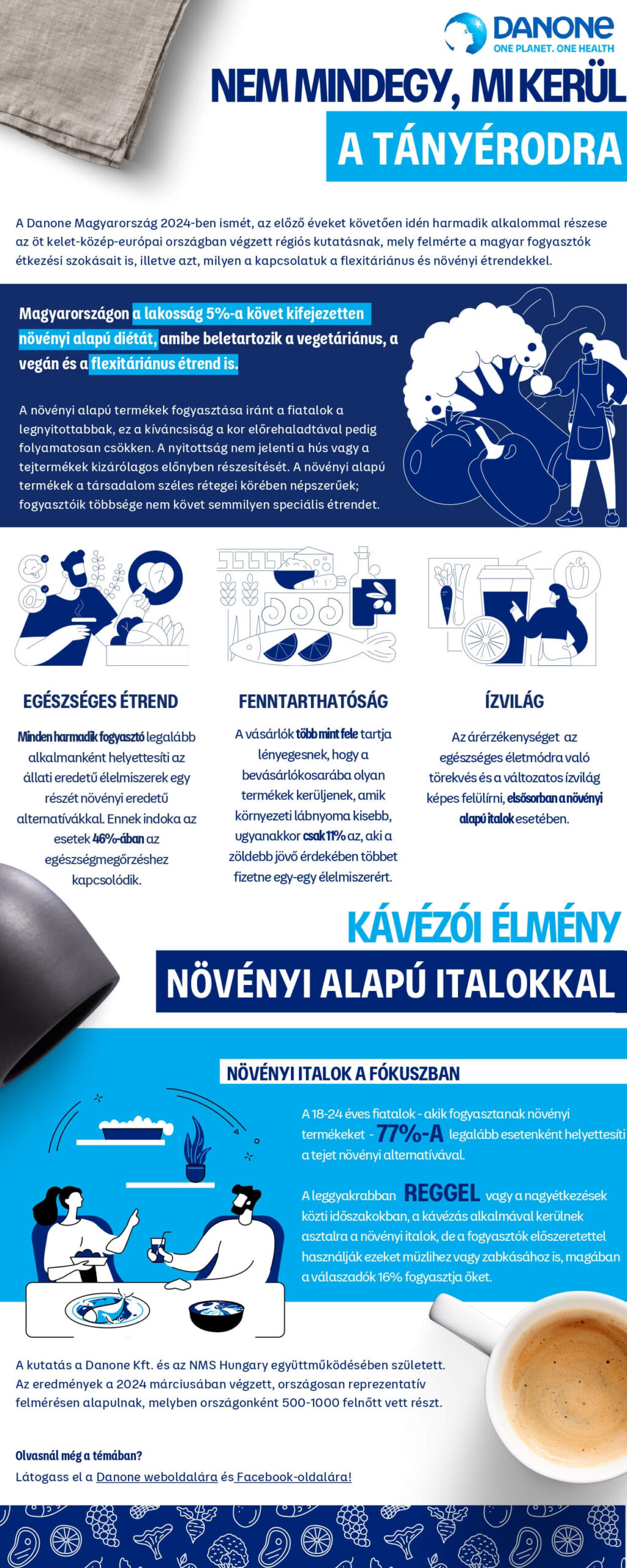
Most people drink plant based drinks with their coffee
In 2024, Danone Hungary will again be part of the regional research conducted in 5 Central and Eastern European countries, which also surveyed Hungarian consumers’ eating habits, their relationship with vegetarian and plant-based diets, which products they most often substitute with plant-based ingredients, why and when they consume these alternatives.
“Hungarian society is increasingly open to plant-based nutrition”
Following previous years, Danone Hungary conducted its flexitarian research for the third time in 2024 to assess consumers’ attitudes, knowledge and needs towards plant-based diets. The results from the 5 countries (Hungary, Romania, Czech Republic, Slovakia, Bulgaria) show that there is still a strong interest in plant-based products, especially among people living in the capital and young people in particular. The research also shows that consumers are most likely to substitute milk with plant-based alternatives. Oats, almonds, coconut and other naturally dairy-free drinks are most often served at breakfast and when drinking coffee. These products now bring the familiar coffee experience in taste and texture.
In Hungary, 31% of the population consciously follow some form of diet, including vegetarian, vegan and flexitarian diets. The latter aims to reduce the amount of animal-based foods and replace them with plant-based alternatives, while not excluding anything from their diet.
“It’s clear that Hungarian society is becoming more open to plant-based diets and we are catching up with the European Union countries, which is a significant milestone on the road to a more sustainable and healthier diet. An important cornerstone of this is that 34% of the Hungarian population now at least occasionally choose plant-based alternatives to animal-based foods. This trend is even more significant among younger people, such as the 18-24 age group, 77% of whom consume plant-based beverages. This figure is important because it reveals patterns of consumption patterns for the coming years.”
says István Miskolczi, CEO of NÉGYOSZ.
One in three consumers substitute at least occasionally some of their animal food with plant-based alternatives. In 46% of cases, the reason for this is related to health preservation, while about a third of respondents who choose plant-based alternatives prefer their taste to that of animal products, with environmental and food intolerance concerns (17% and 16% respectively) coming third and fourth. Young people are the most open to the consumption of plant-based products, and this curiosity declines steadily with age. There is also a difference between respondents living in the capital and those living in rural areas. While in Budapest there is a strong interest in possible alternatives to dairy and meat products, in rural areas 70% of people are even less open to their consumption.
Plant-based drinks also enhance the coffee drinking experience
Danone’s Central and Eastern European companies wanted to know which products are most often substituted by consumers with vegetable alternatives. The results show that most consumers are looking for food products to replace milk and dairy products. Of those who at least occasionally substitute an animal food, 55% look for alternatives to milk, 34% for meat, 33% for butter, 24% for yoghurt and 22% for cheese (there is of course overlap in respondents’ preferences).
77% of young people aged 18-24 replace milk with a vegetable alternative at least occasionally. The main motivation behind the consumption of plant-based drinks is a step-by-step approach to a healthier lifestyle and a more appealing taste.
“The Alpro Barista range is one of the most important and fastest growing segments in our plant-based beverage portfolio. The high level of interest and openness is confirmed by the research we carry out every year to gauge consumer demand. This year, the results of these surveys have shown that certain patterns and preferences have already emerged among consumers. The popularity of our Barista range can also be explained by the fact that most people choose non-dairy beverages when they drink coffee.”
says Vivien Németi, Alpro’s regional senior plant-based innovation manager.
The consumption of plant-based beverages is more common among women, who use non-dairy products not only when drinking coffee, but also when drinking by themselves and when baking or cooking. Plant-based beverages are most often served in the morning or between large meals when drinking coffee, but consumers prefer to use them with cereals or oatmeal, with 16% of respondents also consuming them on their own.
“There is an interesting difference between the consumption habits of men and women. While men look for plant-based alternatives to meat-based foods, women tend to substitute milk, yoghurts and puddings. Although the most popular form of diet in Hungary today is to reduce or completely eliminate carbohydrates, including lactose, people still prefer plant-based drinks to other products, especially when drinking coffee, regardless of these motivations.”
says Emese Antal, dietician, sociologist and professional leader of TÉT Platform.
The products you put in your shopping basket have an impact on your future
Today, it is impossible to ignore the sustainability responsibility of companies and the environmental impact of their products. For Danone as a B Corp company, it was of paramount importance to assess the extent to which consumers are informed about the impact of a company’s portfolio on our planet and how much they consider it to be essential. Today, more than half of consumers consider it important to include products with a smaller environmental footprint in their shopping basket, while only 11% would pay more for a food product to ensure a greener future. However, the price sensitivity behind this result can be outweighed by the desire for a healthy lifestyle and a variety of tastes, especially for plant-based drinks.
